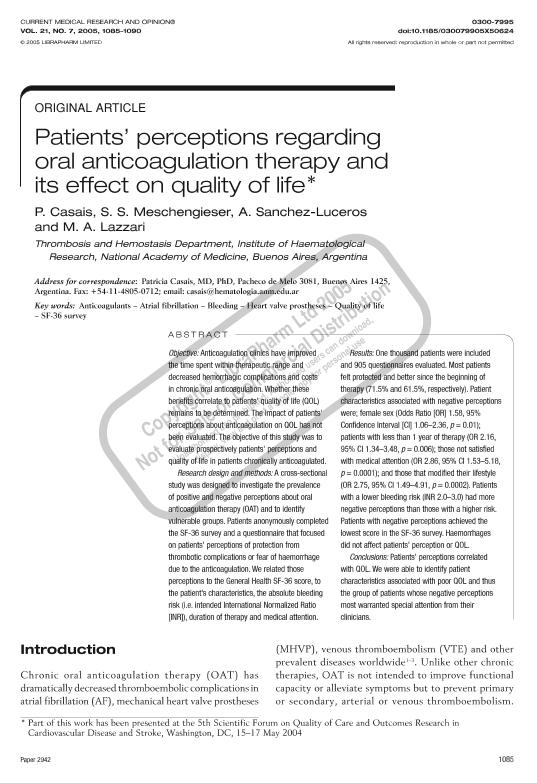Artículo
Patients' perceptions regarding oral anticoagulation therapy and its effect on quality of life
Casais, Patricia; Meschengieser, Carolina ; Sánchez Luceros, Analía Gabriela
; Sánchez Luceros, Analía Gabriela ; Lazzari, María Ángela
; Lazzari, María Ángela
 ; Sánchez Luceros, Analía Gabriela
; Sánchez Luceros, Analía Gabriela ; Lazzari, María Ángela
; Lazzari, María Ángela
Fecha de publicación:
07/2005
Editorial:
Librapharm/informa Healthcare
Revista:
Current Medical Research And Opinion.
ISSN:
0300-7995
Idioma:
Inglés
Tipo de recurso:
Artículo publicado
Clasificación temática:
Resumen
Objective: Anticoagulation clinics have improved the time spent within therapeutic range and decreased hemorrhagic complications and costs in chronic oral anticoagulation. Whether these benefits correlate to patients' quality of life (QOL) remains to be determined. The impact of patients' perceptions about anticoagulation on QOL has not been evaluated. The objective of this study was to evaluate prospectively patients' perceptions and quality of life in patients chronically anticoagulated. Research design and methods: A cross-sectional study was designed to investigate the prevalence of positive and negative perceptions about oral anticoagulation therapy (OAT) and to identify vulnerable groups. Patients anonymously completed the SF-36 survey and a questionnaire that focused on patients' perceptions of protection from thrombotic complications or fear of haemorrhage due to the anticoagulation. We related those perceptions to the General Health SF-36 score, to the patient's characteristics, the absolute bleeding risk (i.e. intended International Normalized Ratio [INR]), duration of therapy and medical attention. Results: One thousand patients were included and 905 questionnaires evaluated. Most patients felt protected and better since the beginning of therapy (71.5% and 61.5%, respectively). Patient characteristics associated with negative perceptions were; female sex (Odds Ratio [OR] 1.58, 95% Confidence Interval [CI] 1.06-2.36, p = 0.01); patients with less than 1 year of therapy (OR 2.16, 95% CI 1.34-3.48, p = 0.006); those not satisfied with medical attention (OR 2.86, 95% CI 1.53-5.18, p = 0.0001); and those that modified their lifestyle (OR 2.75,95% CI 1.49-4.91, p = 0.0002). Patients with a lower bleeding risk (INR 2.0-3.0) had more negative perceptions than those with a higher risk. Patients with negative perceptions achieved the lowest score in the SF-36 survey. Haemorrhages did not affect patients' perception or QOL. Conclusions: Patients' perceptions correlated with QOL. We were able to identify patient characteristics associated with poor QOL and thus the group of patients whose negative perceptions most warranted special attention from their clinicians. © 2005 Librapharm Limited.
Archivos asociados
Licencia
Identificadores
Colecciones
Articulos(IMEX)
Articulos de INST.DE MEDICINA EXPERIMENTAL
Articulos de INST.DE MEDICINA EXPERIMENTAL
Citación
Casais, Patricia; Meschengieser, Carolina; Sánchez Luceros, Analía Gabriela; Lazzari, María Ángela; Patients' perceptions regarding oral anticoagulation therapy and its effect on quality of life; Librapharm/informa Healthcare; Current Medical Research And Opinion.; 21; 7; 7-2005; 1085-1090
Compartir
Altmétricas



